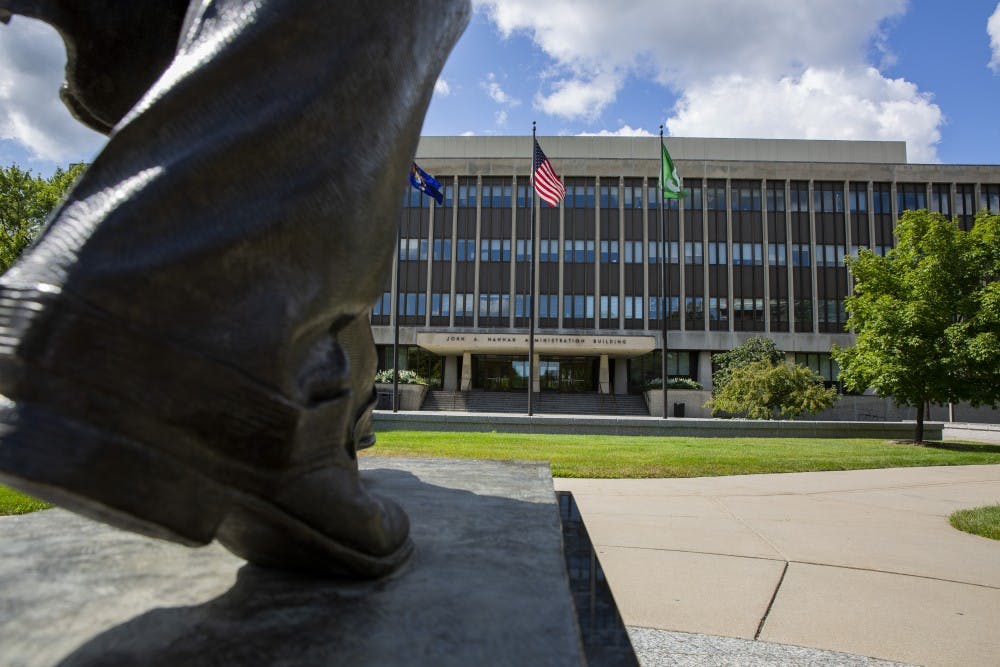Michigan State’s Prevention, Outreach and Education, or POE program released its annual report from its Relationship Violence and Sexual Misconduct prevention workshops from the 2020-21 academic year.
The report compares students’ answers in a pre- and post-workshop survey as well as the overall number of students that participated in the respective POE workshops and announces expansions within the department.
POE, which is a part of MSU’s Office for Civil Rights, Title IX Education and Compliance, focuses on changing the culture surrounding relationship violence and sexual misconduct, or RVSM, on Michigan State’s campus through workshops for undergraduate students and various student groups such as fraternities and sororities.
The three main workshops for undergraduate students, Sexual Assault and Relationship Violence, or SARV, prevention training, which is mandatory for first-year students; bystander network training, which is required for second-year students; and mandatory online prevention education for third and fourth-year students, were conducted entirely online this year because of the COVID-19 pandemic.
In an interview with The State News in January, POE Director Kelly Schweda said that over the summer, her staff has worked hard to transition all of the programs to a virtual format.
"It's not just a recorded Zoom, somebody talking at you," Schweda said. "It's still as interactive. We trained our peer educators — we have over 80 peer educators — we trained them all on a Zoom platform, and it is all still interactive with peer educators leading the discussions. We had to break it down into smaller groups so that it can be managed that way. We had to run three times more (workshops) across campus so that we can manage it in smaller doses, so it still could be interactive.”
There were 489 SARV workshops that served 9,373 first-year students this year. The education-based workshop focuses on the students’ understanding of relationship violence and highlights university policies and resources.
The statistics from the annual report indicate that the SARV workshops worked in terms of student retention of the concepts of the program.
-
I think there is much I can do about sexual misconduct on campus. Prior to attending the workshop, 47% of participants said that they either strongly agreed or agreed to this statement, with 8% saying they strongly agreed. After the workshop, 77% of the participants said they strongly agreed and agreed, with 25% saying they strongly agreed, according to the report.
Develop a plan for ways I might safely intervene as a bystander. According to the report, "Prior to attending the workshop 83% of participants said that they were very likely or likely to engage in the behavior, with 30% saying they strongly agreed. After the workshop, 93% of the participants said they were very likely or likely to engage in this behavior, with 53% saying they were very likely to engage in this behavior."
The bystander network workshop surveys for second-year students showed similar retention rates as the SARV workshops between the pre- and post-workshop surveys.
-
Connect a friend with someone (e.g. counselor, advocate, support person) to talk about an unwanted sexual experience. Prior to attending the workshop 81% of participants said that they were very likely or likely to engage in the behavior, with 35% saying they strongly agreed. According to the report, after the workshop, 90% of the participants said they were very likely or likely to engage in this behavior, with 54% saying they were very likely to engage.
Develop a plan for ways I might safely intervene as a bystander if I see potential abuse happening around me. According to the report, "prior to attending the workshop, 79% of participants said that they were very likely or likely to engage in the behavior, with 26% saying they were very likely to engage. After the workshop, 91% of the participants said they were very likely or likely to engage in this behavior, with 50% saying they were very likely to engage in this behavior.
The annual report also announced new positions in POE and a restructuring of the department. The undergraduate student program was restructured to include an Assistant Director to oversee the creation and delivery of undergraduate programs. They also promoted the Climate and Response Specialist position to a program administrator role to build on POE’s work on campus.
The annual report also included that POE is working with student groups to gather feedback on their programs through a platform called Student Voices for Prevention Initiative. The student council met with POE monthly to review undergraduate student programs and provide feedback.
“For the last three years since our formation as a department, we have not only continued to grow and expand our reach, but to improve our work and our impact,” Schweda said in a press release. “We are committed to continue setting the standard for excellence in prevention of gender-based violence.”
POE’s expansion was not just limited to students. They increased RVSM education programs for faculty and staff as well as MSU healthcare workers.
POE had its second annual summit for MSU faculty and staff in March to have a conversation about sexual-based violence in education and the responsibility of educators to promote a safe culture on campus. The summit had 85 attendees made up of MSU faculty, staff and graduate students.
POE hired a health care prevention specialist to create training for MSU healthcare workers.
The training focuses on teaching healthcare professionals how to identify and report an RVSM incident and how to properly support survivors and others impacted by sexual and relationship violence.
“Prevention work is a critical piece to changing the culture on campus to one that prioritizes safety and care,” Tanya Jachimiak, Office for Civil Rights associate vice president, said in a press release. “I am proud of the work POE continues to do to impact our campus.”
Support student media!
Please consider donating to The State News and help fund the future of journalism.
Discussion
Share and discuss “POE announces department expansion, releases RVSM workshop data in annual report” on social media.







